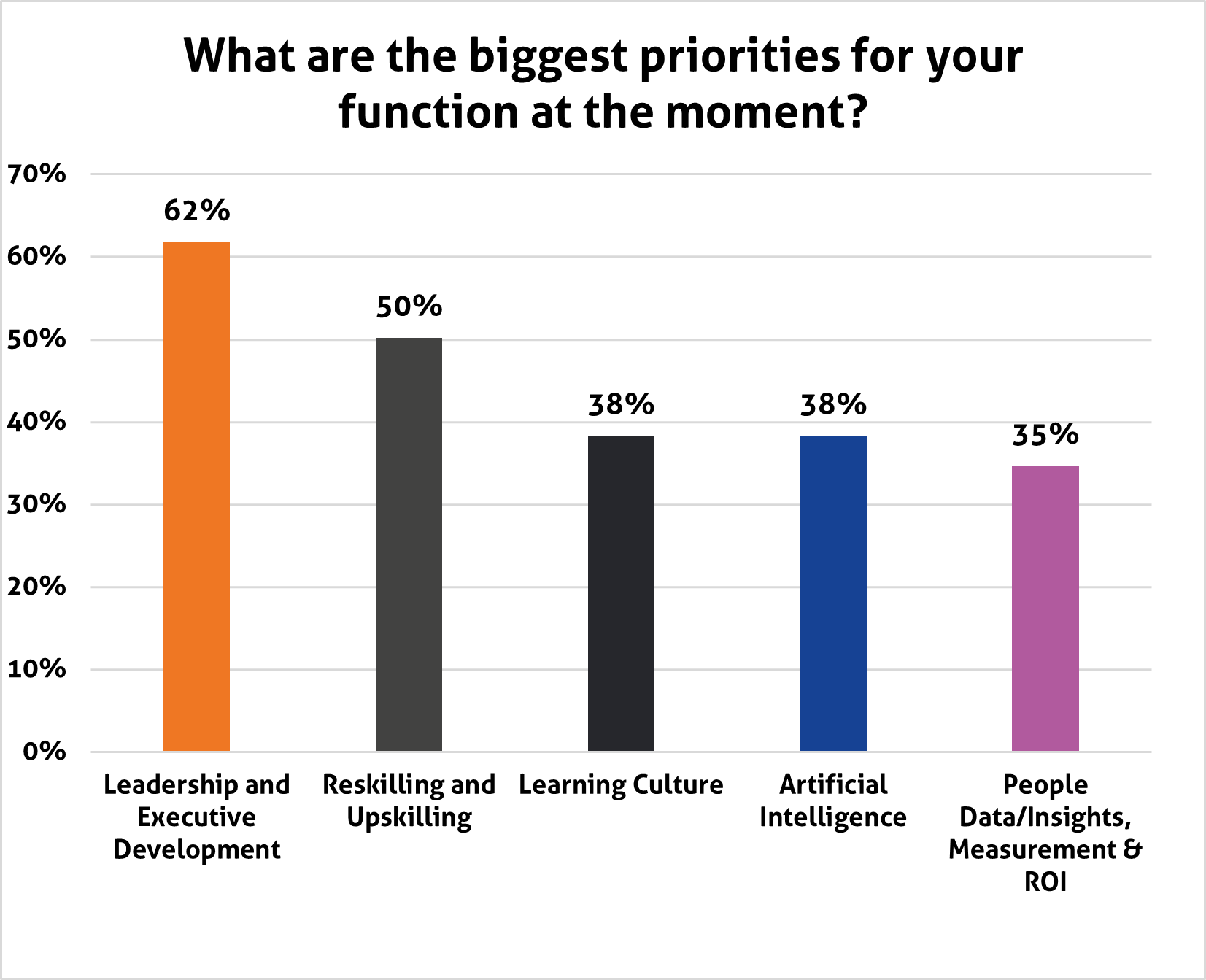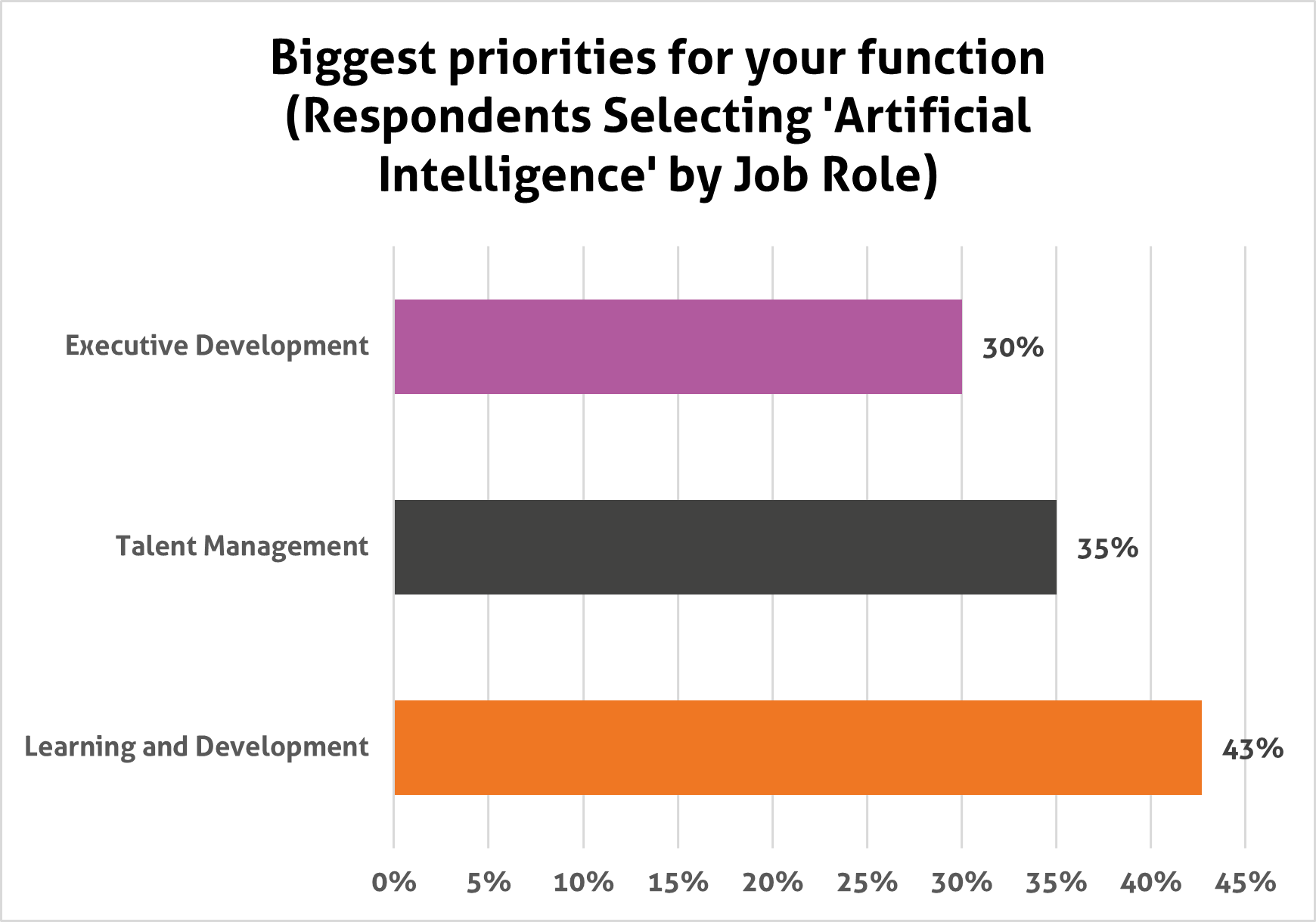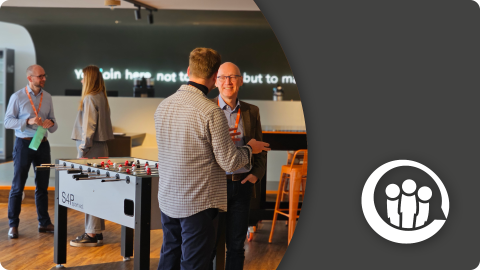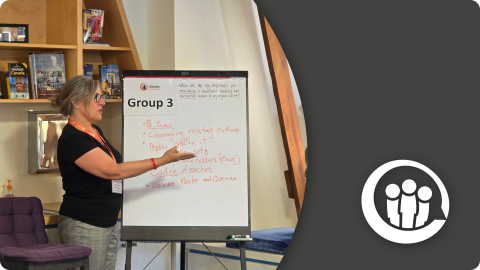iVentiv has spent the first six months of 2024 asking Global Heads of Learning, Talent, and Leadership to share the top priorities and challenges for their function right now.
In this blog, we explore the results, with some preliminary exploration of what the figures tell us about the work of L&D teams across the world right now.
What are the Top Priorities for Learning and Talent Right Now?
At the end of 2023, the most popular area highlighted by respondents was Leadership and Executive Development. So far in 2024, more than 300 C-suite executives, all leading L&D and Talent functions for Global organisations, have responded. We can now reveal that the top priorities for the year to date (with changes since the start of the year) are:
- Leadership and Executive Development: 62% (+6)
- Reskilling and Upskilling: 50% (+5)
- Learning Culture: 38% (-1)
- Artificial Intelligence: 38% (+11)
- People Data/Insights, Measurement and ROI: 35% (+8)
Leadership and Executive Development remains the most selected topic, as it has been since iVentiv started tracking these numbers in 2022. Along with Reskilling and Upskilling, the percentage of respondents selecting Leadership has only risen since the start of the year.
Learning Culture remains the third most selected topic, with the proportion largely unchanged, ahead of Artificial Intelligence. AI was previously included with ‘Learning Technologies’ including LXPs and Virtual Reality. We made it a standalone category this year and the growth in interest reflects that methodological change, though an 11-percentage point rise is still striking. People Data/Insights, Measurement, and ROI drop from fourth to fifth position, but the percentage itself is still up significantly.
Why Isn’t AI Top?
Several surveys of L&D professionals have put AI as the runaway top topic of interest. In that sense, this survey is an outlier. The difference likely lies in the question and the sample. On the one hand, this survey asks for current top priorities. Others ask respondents to predict the biggest trends, a no less valid question to ask. Nonetheless, by asking about current priorities, this survey is more likely to focus attention on the actual work being done.
The seniority of respondents may also play a role. Leadership, skills, and culture, notably, are top-level strategic questions. AI, arguably, will impact junior colleagues’ work more directly, thus broader surveys of L&D professionals (as opposed to leaders) are more likely to capture AI users rather than strategic leaders.
That is reflected in the discrepancy between L&D leaders and Executive Development/Talent Management leaders:
Whereas L&D specialists are concerned about the applications for both the business broadly and the Learning function more specifically, when it comes to HiPo and Executive Development those concerns are less acute. Learning leaders reference using “generative AI for better learning solutions” and “leveraging artificial intelligence to harvest knowledge from communities of practice for basic e-learning.” These are clearly Learning goals rather than business-level priorities.
Leadership, Culture, Skills and Tech Go Hand-in-Hand
AI for AI’s sake may not be a priority, therefore, but new technology is still a key factor behind the leadership and skills agenda. Respondents report working to help “end users adopt new technologies and ways of working”, with leaders needing to be role models for “culture change” in the “conversion to a skills-based organisation.”
Change, even when putting technology aside, is a recurring theme. Change Management has itself been the sixth most selected subject so far this year. For some, that is about internal factors such as a "planned conversion to a skills-based organisation.” For others, it is about external factors in a VUCA world, with more than one respondent referencing “difficult external headwinds” including the “election year” and “global context.”
Building agility by creating a “culture of lifelong learning” has therefore been top of the agenda for Learning executives. Business leaders set the culture, the culture drives continuous skills improvement, and the role of technology is to enable that. Put another way, skills are the What, AI is the How.
Good Data Enables L&D to Solve Business Problems
Data is the fifth of our five focus topics in this blog, but the importance of “People Data/Insights, Measurement and ROI” has seen significant growth (eight percentage points) in the past six months. The combination of AI and the scramble for “skills-based” solutions means that Learning teams are seeking out high-quality data to support “skills mapping” and “Talent Marketplace solutions” for more effective “skills identification and assessment.”
While some still ask “should organisations move to a skills-based [approach],” others are proceeding with more certainty. Establishing “metrics” to feed those initiatives, “measure success,” and “make it work beyond identification of talents” is a significant part of their approach.
Conclusion: L&D is Solving Business Problems
The focus on data and ROI reflects, in part, a continuing anxiety about L&D’s ability to solve business problems, but this data suggests that Learning leaders remain focused on the top-level issues that drive business performance. Rather than pursuing the latest shiny platform, Chief Learning Officers are interrogating new technologies – whether AI-generated content or complex skills mapping – to understand the data that feeds them and how they, in turn, support the leadership, culture, and skills that the business needs to succeed.












